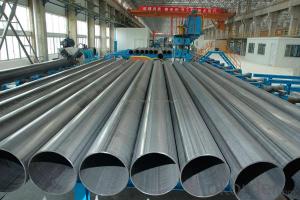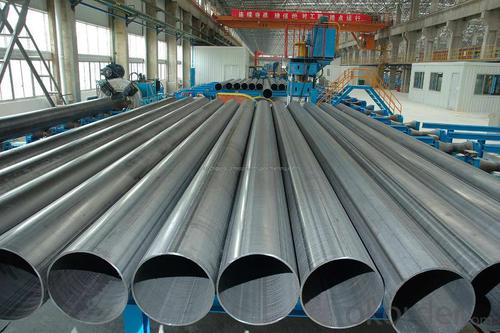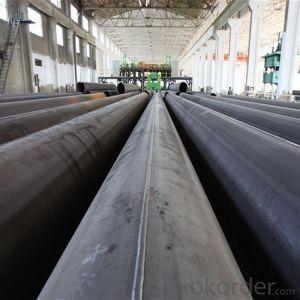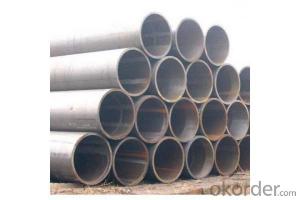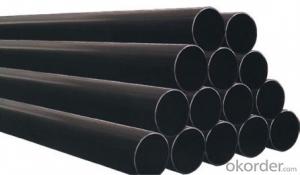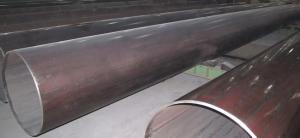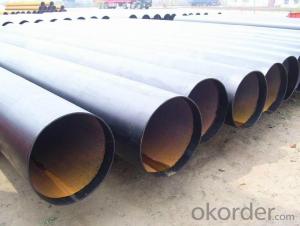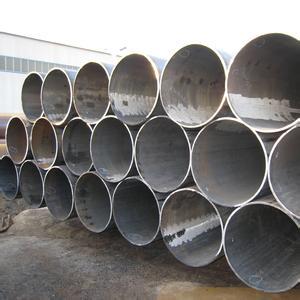42'' CARBON STEEL LSAW WELDED PIPE API/ASTM/JIS/DIN
- Loading Port:
- Tianjin
- Payment Terms:
- TT OR LC
- Min Order Qty:
- 5 m.t
- Supply Capability:
- 300 m.t/month
OKorder Service Pledge
OKorder Financial Service
You Might Also Like
Packaging & Delivery
Packaging Detail: | standard export packing or as customer's requirement |
Delivery Detail: | within 10 - 30 days |
Specifications
Spiral Welded Steel Pipes and Tubes
1.Material:Q195-Q235
2.Length:1-12m
3.WT:1.0-14mm
4.O.D.:20-273mm
Product Description:
1.Material : Q235,Q345,L245,L290,L360,L415,L450,L485,GrB,X42,46,X52,X56,X60,X65,X70,X80,X100
2,Standard: SY/T5037-2000,GB/T9711-2011,API Spec 5L PSL1/PSL2,ASTM A252\A53,ISO3183,DIN17172,EN10217,JIS G3457,AWWA C200,ASTM A139,ASTM A671,ASTM A672
3.Wall thickness: 3.0mm-30mm
4.Outer diameter: φ168mm-3020mm
5,Length: 5m-12m or as your requirement
6,Corrosion protection standard: DIN30670,DIN30671, AWWAC210, AWWA C203, SY/T0413-2002,SY/T0414-2002
7,Application: Oil, gas, natural gas, water pipe, thermal electricity pipe, steel structure engineering, etc
Q195-q345 Material Steel Pipe's Materials
Elements | Chemical Compsition% | Mechanical Property | ||||||
C% | Mn% | S% | P% | Si% | Yield Point (Mpa) | Tensile Strength(Mpa) | Elongation | |
Q195 | 0.06-0.12 | 0.25-0.50 | <0.050< span=""> | <0.045< span=""> | <0.030< span=""> | >195 | 315-430 | 32-33 |
Q215 | 0.09-0.15 | 0.25-0.55 | <0.05< span=""> | <0.045< span=""> | <0.030< span=""> | >215 | 335-450 | 26-31 |
Q235 | 0.12-0.20 | 0.30-0.70 | <0.045< span=""> | <0.045< span=""> | <0.030< span=""> | >235 | 375-500 | 24-26 |
Q345 | <0.20< span=""> | 1.0-1.6 | <0.040< span=""> | <0.040< span=""> | <0.55< span=""> | >345 | 470-630 | 21-22 |
Packaging & Delivery
Packaging Detail: | Normal exporting packing,in container or bulk vessel or as per clients' request |
Delivery Detail: | 2 months after confimed contract |
Specifications
Large Diameter API 5L X70 PSL2 LSAW Steel Pipe
Grade: X42, X46, X50, X52, X60, B, C
OD: 1.5"-28"
WT: SCH10-SCH160
Brand:TPCO
Large Diameter API 5L X70 PSL2 LSAW Steel Pipe
Specifications:
u Standard: API 5L
u Grade: B, C, X42, X46, X50, X52, X56, X60, X65, X70, X80
u OD: 1.5"-28"
u WT: SCH10-SCH160
u Length: 5-12m
u Ends Finish: plain end, bevel end, grooved end
u Surface Treatment: bare, black varnished, oiled finish, red color, anti-corrosion, 3PE, FBE or epoxy coating
u Technique: hot rolled or cold drawn
u Application: api 5l steel pipe for conveying oil, water, gas
u Invoicing: based on theoretical weight or actual weight
u Payment Terms: L/C at sight, T/T or Western Union
u Trade Terms: FOB, CFR, CIF
u Certification: ABS manufacturing assessment, ABS design assessment, API 5CT, API 5L, DNV manufacturer certificate, ISO9001 quality management system certificate, ISO14001 environment management system certificate, GB/T28001 occupational health and safety management system certificate, A1 class manufacturing license of special equipment certificate, CCS, GL, LR, SGS, TüV, PDE
- Q: Seamed steel pipe seamless steel pipe, carbon steel pipe, galvanized pipe, four how to distinguish between
- Seamless steel tube processing technology:1.1 、 hot rolled seamless tubes are usually produced on automatic rolling mills. After checking and cleaning the surface defects, the solid tube is cut into the required length, centring on the end face of the tube blank, then sent to the heating furnace and punched on the piercer. At the same time, the hole rotates and advances continuously. Under the action of the roller and the plug, the inner cavity of the pipe blank is gradually formed, and the cavity is called the capillary. Sent to the automatic tube rolling mill on rolling. Finally, the thickness of the whole machine is the same, and the diameter of the sizing machine is determined to meet the specifications. It is an advanced method to produce seamless steel tube by continuous rolling mill.1.2, in order to obtain smaller size and better quality of seamless tube, cold rolling, cold drawing method must be used or combined. Cold rolling is usually carried out on a two roller mill, where the steel tube is rolled in the annular groove made of variable cross section, round hole groove and stationary conical head. Cold drawing is usually performed in single chain or double chain cold drawn machines from 0.5 to 100T.1.3, the extrusion method will soon heat the tube blank in the closed extrusion cylinder, the perforation bar and extrusion rod movement, so that extrusion parts from the smaller hole extrusion. This method can produce smaller diameter steel pipe.Seamless steel pipe use: mainly used to transport fluid pipeline or structural parts.The main use of steel pipe joints (steel) two welded together, so the price is cheap, widely used.
- Q: Can steel pipes be used for transporting sewage?
- Yes, steel pipes can be used for transporting sewage. Steel pipes are commonly used in sewage systems due to their durability, strength, and corrosion resistance, making them suitable for carrying wastewater and sewage over long distances.
- Q: What are the different methods of joining steel pipes?
- There are several different methods of joining steel pipes, including welding, threading, flanging, grooving, and using mechanical connectors.
- Q: What are the different methods of threading steel pipes?
- There are several methods of threading steel pipes, including manual threading, machine threading, and cutting threads using a thread cutting die. Manual threading involves using a handheld pipe threading tool to create threads on the pipe. Machine threading utilizes a power-driven pipe threading machine to efficiently create threads. Cutting threads using a thread cutting die involves using a die and a handle to manually cut threads on the pipe. These methods are commonly used in various applications, such as plumbing, construction, and industrial settings.
- Q: How are steel pipes used in the construction of stadiums and arenas?
- Steel pipes are commonly used in the construction of stadiums and arenas for various purposes such as structural support, plumbing, and HVAC systems. They provide a strong and durable framework for the building, allowing for large spans and open spaces. Additionally, steel pipes are used for the distribution of water, gas, and waste, as well as for ventilation and air conditioning systems. Overall, steel pipes play a crucial role in ensuring the safety, functionality, and longevity of stadiums and arenas.
- Q: What's the difference between seamless steel pipe and welded pipe?
- Use, seamless steel pipe is generally used in the condition of higher use, such as temperature and pressure higher, corresponding to the requirements of stress corrosion, seamless steel pipe. With vice.
- Q: Galvanized steel pipe, PPR pipe, PE pipe, U-PVC pipe and HDPE double wall corrugated pipe and what is the difference between the characteristics of
- Galvanized steel pipe is a kind of antirust steel pipe, often used in relatively high water supply pipeline or hot water pipeline, the price is higher, can use for at least 30 years;PPR pipe is a kind of polypropylene plastic, which is commonly used in environmental protection plastic pipes, but only suitable for low temperature occasions. It is mainly used for water supply;
- Q: Can steel pipes be used for heat exchangers?
- Yes, steel pipes can be used for heat exchangers. Steel is a commonly used material for heat exchangers due to its high thermal conductivity and durability. It can efficiently transfer heat between two fluids, making it suitable for various industrial applications.
- Q: How are steel pipes used in the construction of coal-fired power plants?
- Steel pipes are used in the construction of coal-fired power plants for various purposes. They are primarily utilized for the transportation of coal and other materials such as water, steam, and flue gas within the plant. Steel pipes are also used for the construction of high-pressure and high-temperature pipelines, which are essential for the efficient operation of boilers, turbines, and other equipment. Additionally, steel pipes are employed in the construction of structural components, such as support systems, frames, and columns, providing strength and stability to the overall infrastructure of the power plant.
- Q: How are steel pipes used in automotive manufacturing?
- Automotive manufacturing extensively employs steel pipes for a multitude of purposes. The exhaust system represents one of the principal functions of steel pipes in this industry. In vehicles, the exhaust system is accountable for securely eliminating harmful gases generated during the combustion process. Steel pipes are employed in fabricating the exhaust manifold, which collects exhaust gases from the engine cylinders and directs them towards the exhaust pipe. Additionally, steel pipes are also utilized in constructing the chassis and frame of vehicles. The chassis offers structural support and aids in upholding the overall strength and stability of the vehicle. Due to their exceptional strength and durability, steel pipes are the optimal choice for manufacturing the chassis and frame. These pipes are frequently welded together to form a rigid and robust structure capable of withstanding diverse forces and impacts. Furthermore, steel pipes find application in the suspension system of automobiles. The suspension system is responsible for delivering a comfortable and smooth ride by absorbing shocks and vibrations. Steel pipes are employed in manufacturing suspension components such as control arms, tie rods, and sway bars. These components contribute to maintaining the stability, handling, and overall performance of the vehicle. Moreover, steel pipes are utilized in the fuel system of automobiles. They are responsible for transporting fuel from the fuel tank to the engine. These pipes necessitate resistance to corrosion and possess high tensile strength to guarantee the safe and efficient delivery of fuel. In conclusion, steel pipes play a pivotal role in automotive manufacturing. They are utilized in diverse applications including the exhaust system, chassis and frame construction, suspension system, and fuel system. The incorporation of steel pipes in these areas ensures the durability, strength, and performance of vehicles while simultaneously upholding safety and efficiency.
Send your message to us
42'' CARBON STEEL LSAW WELDED PIPE API/ASTM/JIS/DIN
- Loading Port:
- Tianjin
- Payment Terms:
- TT OR LC
- Min Order Qty:
- 5 m.t
- Supply Capability:
- 300 m.t/month
OKorder Service Pledge
OKorder Financial Service
Similar products
Hot products
Hot Searches
Related keywords
